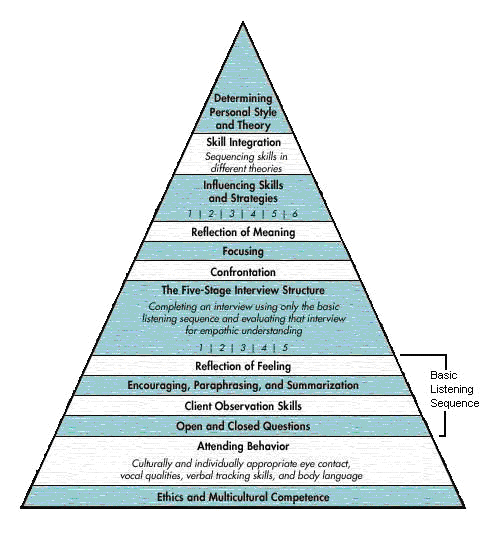Lesson 15: Supportive Counseling
Attention

In the course Interviewing and Counseling we focus our efforts on learning the basic skills associated with the interviewing and counseling process. Many times, as a rehabilitation provider, we are engaged with our clients in the process of helping them solve problems...this is not too different from much of what is "counseling" at the professional level.
The hierachy above reflects the basic MicroSkill model of counseling. It does not focus on specific theories (such as psychodynamic, behavioral, or insight oriented therapies) instead it focuses on the skills of the counselor in relation to listening, acquiring the details of the client's story, helping the client to "restory" and find meaning, and finally assisting the client in formulating a plan for change.
Learning Outcomes
Upon completion of this lesson's material, students will be able to:
- Identify the role that interviewing and counseling plays in the psychosocial rehabilitation process
Teaching
Interviewing and Counseling
The role of "supportive counseling" is encompassed in the Interviewing and Counseling course within the Mental Health program. The skills supported in this course assist in assessment, diagnosing, planning, and evaluating the process of rehabilitation.
Consider the Skills Associated with Interviewing and Counseling
- Ethics and mulitculural competence
- Attending behavior
- Open and closed questions
- Client observation skills
- Encouraging, paraphrasing, and summarizing
- Reflection of feelings
- Confrontation
- Focusing
- Reflection of meaning
- Influencing
Counseling Process
Ultimately we often conclude that the best source of the "answer" to a problem lays within the individual themselves. We may need to simply create the opportunity for it to emerge. Sometimes this can happen fast while at other times it may take quite some time
- Building the relationship
- Ethics and multicultural competence
- Attending behavior
- Encouraging, paraphrasing, and summarizing
- Getting the story
- Open and closed questions
- Client observation skills
- Restorying
- Reflection of feelings
- Focusing
- Reflection of meaning
- Action planning
- Confrontation
- Influencing
Assessment
Lesson 15 Discussion
What qualities make for an effective counselor? OPTIONAL (This is NOT required) Discuss any personal counseling experiences you have had. What went well? What did not go well? What were the benefits of counseling for you?
Lesson 15 Quiz
- Write a brief esssay (approximately 400 words) that describes how interviewing and counseling plays a role in the psychosocial rehabilitation process. Reflect on your own approach to the use of your "self" (knowledge and experiences) in influencing others.